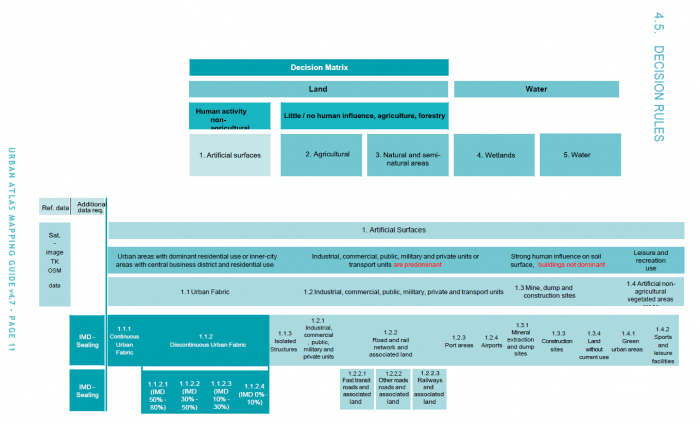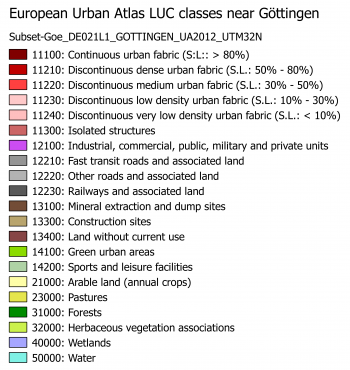Training data selection (SCP)
(→Defining land cover classes) |
(→Defining land cover classes) |
||
| Line 27: | Line 27: | ||
| 2 | | 2 | ||
| Agricultural | | Agricultural | ||
| − | | | + | | 1 |
| Arable land | | Arable land | ||
| 255-255-168 | | 255-255-168 | ||
| + | |- | ||
| + | | 2 | ||
| + | | Agricultural | ||
| + | | 2 | ||
| + | | Bare soil | ||
| + | | 253-191-111 | ||
| + | |- | ||
| + | | 2 | ||
| + | | Agricultural | ||
| + | | 3 | ||
| + | | Pasture | ||
| + | | 230-230-77 | ||
| + | |- | ||
| + | | 3 | ||
| + | | Natural and semi-natural areas | ||
| + | | 1 | ||
| + | | Broad leaved tree cover | ||
| + | | 128-255-0 | ||
| + | |- | ||
| + | | 3 | ||
| + | | Natural and semi-natural areas | ||
| + | | 1 | ||
| + | | Coniferous tree cover | ||
| + | | 128-255-0 | ||
| + | |- | ||
| + | | 4 | ||
| + | | Wetlands | ||
| + | | 1 | ||
| + | | Reed | ||
| + | | 128-255-0 | ||
| + | |- | ||
| + | | 5 | ||
| + | | Water | ||
| + | | 1 | ||
| + | | Water | ||
| + | | 128-242-230 | ||
| + | |- | ||
| + | | 9 | ||
| + | | Miscellanous | ||
| + | | 1 | ||
| + | | No data (cloud and shadow) | ||
| + | | 255-255-255 | ||
| + | |- | ||
| + | |} | ||
| + | | 9 | ||
| + | | Miscellanous | ||
| + | | 1 | ||
| + | | Nod data (missing imagery) | ||
| + | | 0-0-0 | ||
|} | |} | ||
| − | |||
[[category:QGIS Tutorial]] | [[category:QGIS Tutorial]] | ||
Revision as of 12:58, 19 April 2018
Defining land cover classes
Before starting to map land cover classes using Sentinel-2 satellite images we need clear definitions and a classification scheme. An example for a hierarchical land use and land cover (LUC) classification scheme is the European Urban Atlas. The scheme defines 5 main meta-classes where the class 1. Artificial surfaces has many sub classes as shown in figure A.
The specification other metaclasses is not as detailed. If we are more interested in forest and open area classes we need to adapt and modify this scheme. On the lowest level not all classes defined in the European Urban Atlas do also appear in the surroundings of Göttingen (figure B). In addition we need to consider the phenolgical development of vegetation at specific acquisiton dates and to specify more classes which can possibly be identified in multispectral feature space of the satellite image. An example of an adapted simplified scheme is shown in the table below.
| MC ID | MC info | C ID | C info | RGB code |
|---|---|---|---|---|
| 1 | Artificial surfaces | 1 | Built-up | 230-77-0 |
| 2 | Agricultural | 1 | Arable land | 255-255-168 |
| 2 | Agricultural | 2 | Bare soil | 253-191-111 |
| 2 | Agricultural | 3 | Pasture | 230-230-77 |
| 3 | Natural and semi-natural areas | 1 | Broad leaved tree cover | 128-255-0 |
| 3 | Natural and semi-natural areas | 1 | Coniferous tree cover | 128-255-0 |
| 4 | Wetlands | 1 | Reed | 128-255-0 |
| 5 | Water | 1 | Water | 128-242-230 |
| 9 | Miscellanous | 1 | No data (cloud and shadow) | 255-255-255 |
| 9 | Miscellanous | 1 | Nod data (missing imagery) | 0-0-0 |}

